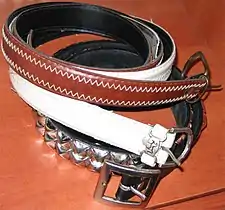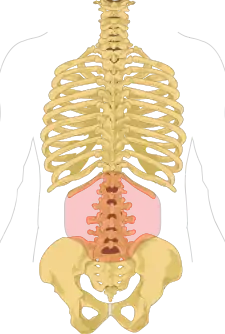josta
See also: jostā
Finnish
Latvian

Jostas (1)

Josta apvidus (4)
Etymology
From the same stem found in josla (“zone, strip”), Proto-Indo-European *yo(u)s- (“to girdle”) (itself from *yeu- (“to bind”)), but with a different suffix (-t(a) instead of -l(a)). Cognates include Lithuanian júosta (“belt”), Proto-Slavic *po-jasъ (compare Russian пояс (pojas)), Sanskrit रास्ना (rā́snā, “girdle”) (< *yā́s-nā), Ancient Greek ζῶμα (zôma, “loincloth, drawers”) (< *zōsma < *yo(w)s-ma-).[1]
Noun
josta f (4th declension)
- belt (a band worn around the waist, to keep clothes in place, to hold weapons, or serve as decoration)
- josta ar sprādzi ― belt with a buckle
- pīta josta ― braided belt
- mēteļa, jakas josta ― coat, jacket belt
- aizsprādzēt, savilkt jostu ― to buckle, to tighten the belt
- belt (a belt-like strap or band to hold someone in place)
- drošības josta ― safety belt (e.g., in a car)
- glābšanas josta ― life belt
- (figuratively) belt-like area around something
- ezera ūdeni apjož smilšu josta ― a sand belt surrounded the waters of the lake
- waist, loins (part of the body between the chest and the hips)
- jostas apvidus ― lumbar region
- jostas skriemeļi, muskulis, nervi ― lumbar vertebrae, muscle, nerves
Declension
Declension of josta (4th declension)
See also
References
- Karulis, Konstantīns. 1992, 2001. Latviešu etimoloģijas vārdnīca. Rīga: AVOTS. →ISBN.
This article is issued from Wiktionary. The text is licensed under Creative Commons - Attribution - Sharealike. Additional terms may apply for the media files.